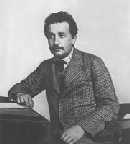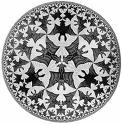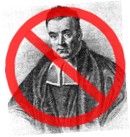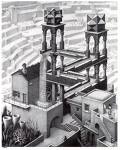|
John D. Norton
Research
|
|
home >> research |
|
|
Physics, History
|
 |
History of General
Relativity and Gravitation |
My research interests in history of physics began
with close scrutiny of Einstein's discovery of the general theory of
relativity. Einstein's "Zurich notebook gives us extraordinary
insight into Einstein's step by step reflections at a decisive
moment in the discovery of the theory. |
|
History of Special
Relativity and Einstein's Work of
1905 |
On the centenary of Einstein's annus mirabilis of
1905, I revisited his discovery of the special theory of relativity
in an attempt to understand the discovery better. I also looked at
Einstein work in statistical physics of 1905 and the miraculous
light quantum argument. |
|
More in History
of Science |
More, including a paper on Galileo's rejection of
the speed-distance law of fall; and Einstein as the greatest of the
nineteenth century physicists. |
|
Physics, Philosophy
|
 |
Philosophy of
Relativity, Space and Time |
Einstein's work on general relativity raises
numerous philosophical puzzles on the content and status of its
foundational principles and the nature of space and time. |
|
Maxwell's
Demon, Landauer's Principle and the Thermodynamics of Computation |
A long-standing tradition in physics posits a
connect between information processing and thermodynamic entropy. It
uses the connection to protect the second law of thermodynamics from
Maxwell's demon and to map out minimum levels of thermodynamic
dissipation in computing.
My reluctant conclusion is that this tradition is fatally flawed.
Its results derive from misunderstandings of thermodynamics and
statistical physics. |
|
Approximations,
Idealizations and Phase Transitions |
Do we really have to consider systems with
infinitely many components to recover phase transitions in
statistical physics? This question powers some tangled debates that
I try to unravel. |
|
Supertasks,
Indeterminism
The dome |
Supertasks involve the completion of infinitely many
processes in a finite time and have unexpected properties such as
indeterminism. Some exceptional simple systems may also violate
determinism. |
|
Philosophy of
Quantum Theory |
Here are some papers trying to make sense of the odd
world of the quantum. |
|
Induction and Confirmation
|
 |
Material
Theory of Induction |
What licenses an inductive inference is not its
conformity to a universal schema, but material facts that obtain
locally. |
|
Survey Articles |
Surveys of various theories of induction. |
 |
Critique of
Bayesianism |
While Bayesian confirmation theory has many
important applications, I do not believe that it is the One True,
Universal Logic of Induction. |
|
Skeptical
Principles |
The literature on induction hosts principled
challenges to inductive inference. The best known is the
"underdetermination thesis." In its strongest form, it is little
more than vague speculation. I also doubt the import of "grue." |
|
Formal
Approaches |
The probability calculus has long been the default
instrument for giving a mathematical account of inductive inference.
I explore other possibilities. |
|
Case
Studies |
My claims about inductive inference are illustrated
in case studies drawn from the history of science. |
|
History of
Chance |
Some studies of earlier ideas of chance |
|
General Philosophy of Science
|
 |
Thought
Experiments |
I have defended a deflationary view of thought
experiments as merely picturesque arguments without special
epistemic powers. |
|
Causation |
The world is not fundamentally causal, I urge, in
the sense that it fails to provide us with a principle of causality
to which all sciences must conform. |
|
Empiricism |
The present literature in empiricism is still controlled by concerns developed in the 17th century. There is an urgent need for a version of empiricism better adapted to modern science. I offer it as "small-e empiricism." |
|
More Philosophy of
Science |
I explain the tolerance of some scientific theories
for logical inconsistency in terms of content driven strategies; how
theoretical terms can have stable referents contrary to the
incommensurability thesis; and more: memories of the past, the two
envelope paradox. |
|
|




